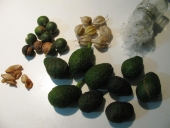S. Marshall wrote:Wow, hearing how the Kiwi could use 1-2 meters separation is quite worrisome. I may need to stick to the Virginia Creeper and maybe that is going to be too problematic as well. My cattle panel is only 5" away from the siding. I had hoped the canopy would be so dense that nothing could grown underneath it (leaving the siding free from vines).
Am I highly mistaken?
My experience is more with commercial vines rather than home garden ones, so I can only speculate based on my in-field observations. For vines pruned vertically (sometimes done for male vines underneath the canopy), this year's growth often extends 30-50cm away from the supports. A distance of 5" will mean that the vines are basically certain to reach the wall. They'll go upward to find sunlight, but they might find a gap in your siding instead. If it were me, I'd want enough space that you can either prune through your cattle panel, or get in behind it with a ladder. That all being said, I'd take
Actinidia arguta near a structure over Virginia creeper. The way Virginia creeper adheres to structures is an issue not shared with kiwiberry - the vines just wrap themselves around whatever they can grab.
William Bronson wrote:
My kiwi is on the north side of an opaque fence, right next to the chicken compost area.
I thought kiwi hated lots of direct sunlight , but If I'm off base that would explain my lack of success.
It is finally getting sorta outta hand but that's taken years to happen.
Still no flowers, much less fruit.
Actinidia is grown commercially in full sun. In nature, the vines climb to the top of trees to access sun. Growing in shade that far from the equator is likely one of your issues. Plants in nature in the shade tend not to flower as much as vines in the sunbathed canopy.









